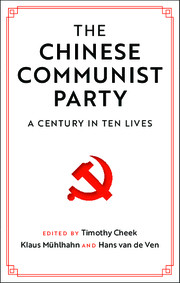Book contents
- Reviews
- The Chinese Communist Party
- The Chinese Communist Party
- Copyright page
- Contents
- Illustrations
- About the Contributors
- Acknowledgments
- Timeline of the Chinese Communist Party
- Map of China Today
- Introduction
- Chapter 1 – 1920s
- Chapter 2 – 1930s
- Chapter 3 – 1940s
- Chapter 4 – 1950s
- 4 The 1950s
- Chapter 5 – 1960s
- Chapter 6 – 1970s
- Chapter 7 – 1980s
- Chapter 8 – 1990s
- Chapter 9 – 2000s
- Chapter 10 – 2010s
- Afterword
- Appendix Selected Further Readings
- Notes
- Index
4 - The 1950s
From Fallen Star to Red Star: Shangguan Yunzhu
from Chapter 4 – 1950s
Published online by Cambridge University Press: 06 May 2021
- Reviews
- The Chinese Communist Party
- The Chinese Communist Party
- Copyright page
- Contents
- Illustrations
- About the Contributors
- Acknowledgments
- Timeline of the Chinese Communist Party
- Map of China Today
- Introduction
- Chapter 1 – 1920s
- Chapter 2 – 1930s
- Chapter 3 – 1940s
- Chapter 4 – 1950s
- 4 The 1950s
- Chapter 5 – 1960s
- Chapter 6 – 1970s
- Chapter 7 – 1980s
- Chapter 8 – 1990s
- Chapter 9 – 2000s
- Chapter 10 – 2010s
- Afterword
- Appendix Selected Further Readings
- Notes
- Index
Summary
Chapter 4 focuses on the career of the actress Shangguan Yunzhu, from bourgeois film star in late 1940s Shanghai to re-educated “art and literary worker” in post-revolutionary New China. Shangguan’s early career and education enjoyed limited success but built on her fortuitous affiliation with the left-wing Kunlun Film Company. Shangguan’s post-revolutionary private and professional life had ups and downs, including allegations against her husband, Cheng Shuyao, during the Three Antis campaign (anti-corruption, anti-waste, anti-bureaucracy) in 1951. Her return to the limelight as a re-educated “old star” came in the context of PRC cinema of the mid-1950s. The controversy surrounding a much-publicized 1956 dinner she had with Mao Zedong shaped Shangguan’s own political fortunes compared to those of her colleagues during the Anti-Rightist movement of 1957. Finally, Shangguan was denounced over a series of humiliating struggle sessions at the start of the Cultural Revolution, which coincided with a diagnosis of terminal breast cancer, together leading the actress to commit suicide in 1968. Shangguan’s legacy, with her close relationship with Mao and Jiang Qing, reveal the persistence of metropolitan modernity in spite of the Party’s mainstream revolutionary socialist discourse.
Keywords
- Type
- Chapter
- Information
- The Chinese Communist PartyA Century in Ten Lives, pp. 73 - 88Publisher: Cambridge University PressPrint publication year: 2021



